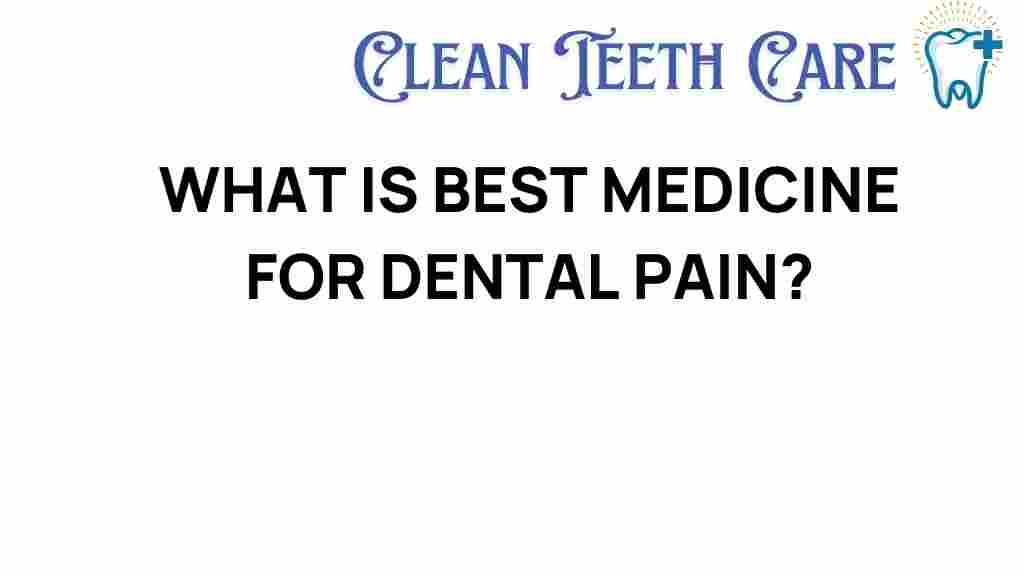Uncovering the Best Medicine for Dental Pain Relief
Dental pain can be a distressing experience for many individuals. Whether it’s a sharp ache, a dull throb, or sensitivity to hot and cold, the pain can significantly affect your daily life. Understanding the various treatments available for dental pain is essential for maintaining good oral health and ensuring comfort. In this article, we will explore the best methods for pain relief, discuss the symptoms associated with dental issues, and provide insights into appropriate medications and home remedies.
Understanding Dental Pain
Before diving into pain relief options, it’s crucial to understand the common causes of dental pain. It can arise from various dental issues, including:
- Tooth decay
- Gum disease
- Tooth abscess
- Cracked or fractured teeth
- Teeth grinding (bruxism)
- Impacted wisdom teeth
Each of these conditions can result in different symptoms, leading to varying degrees of discomfort. Recognizing the symptoms can help you seek appropriate emergency care when necessary.
Symptoms of Dental Pain
Common symptoms associated with dental pain may include:
- Sharp or throbbing pain in the teeth
- Sensitivity to hot or cold foods and beverages
- Swelling or tenderness in the gums
- Persistent bad breath
- Pain when biting or chewing
- Swelling around the jaw or face
If you experience severe symptoms, it is advisable to consult with a dentist as soon as possible.
Medications for Dental Pain Relief
When it comes to managing dental pain, several medications can provide effective pain relief. Here are the most commonly recommended options:
- Over-the-counter pain relievers: Nonsteroidal anti-inflammatory drugs (NSAIDs) such as ibuprofen or naproxen can help reduce inflammation and alleviate pain.
- Acetaminophen: This analgesic can provide relief for mild to moderate pain without the anti-inflammatory effects.
- Prescription medications: For more severe pain, dentists may prescribe stronger medications, including opioids, but these should be used with caution.
Always consult with a healthcare professional before starting any new medication, especially if you have underlying health conditions or are taking other drugs.
Step-by-Step Guide to Managing Dental Pain
If you’re experiencing dental pain, here’s a step-by-step guide to managing it effectively:
- Identify the Source: Pay attention to the specific areas of discomfort and any associated symptoms.
- Use Over-the-Counter Pain Relief: Take NSAIDs or acetaminophen as directed on the package to help reduce pain.
- Apply Cold Compress: Place a cold compress on the affected area for 15-20 minutes to reduce swelling and numb the pain.
- Practice Good Oral Hygiene: Gently brush and floss around the painful area to keep it clean.
- Limit Certain Foods: Avoid very hot, cold, or sugary foods that may exacerbate sensitivity.
- Consult a Dentist: If the pain persists or worsens, schedule an appointment for a comprehensive examination.
Home Remedies for Dental Pain Relief
In addition to medications, there are several effective home remedies that can help alleviate dental pain:
- Saltwater Rinse: Mix a teaspoon of salt in warm water and use it as a mouth rinse to help reduce inflammation.
- Clove Oil: This natural remedy has analgesic properties. Apply a small amount to a cotton ball and place it against the painful tooth.
- Garlic: Known for its antibacterial properties, chewing a clove of garlic can help alleviate dental pain.
- Peppermint Tea Bags: Soak a peppermint tea bag in hot water, let it cool, and then apply it to the affected area for soothing relief.
- Hydrogen Peroxide Rinse: A diluted hydrogen peroxide rinse can help reduce bacteria and provide temporary relief.
While these remedies can provide temporary relief, remember that they are not substitutes for professional dental care.
Troubleshooting Dental Pain
If you find that your dental pain persists despite home treatments and over-the-counter medications, consider the following troubleshooting tips:
- Evaluate Your Oral Hygiene Routine: Ensure you’re brushing twice a day and flossing daily to keep your mouth free of plaque and bacteria.
- Monitor Your Diet: Reduce sugary and acidic foods that can contribute to tooth decay and sensitivity.
- Check for Grinding: If you suspect you grind your teeth at night, consult a dentist about a night guard.
- Keep Hydrated: Drink plenty of water to help wash away food particles and bacteria.
- Schedule Regular Dental Check-ups: Preventive dental visits can catch issues before they lead to more severe pain.
By addressing these factors, you may alleviate some of the discomfort associated with dental pain.
Emergency Care for Dental Pain
Sometimes, dental pain can indicate a more serious issue that requires immediate attention. You should seek emergency care in the following situations:
- Severe, unmanageable pain
- Signs of infection, such as fever or swelling
- Injury to the mouth or teeth
- Knocked-out tooth or dental trauma
In such cases, contact your dentist or visit the nearest emergency room for prompt treatment. Early intervention can prevent further complications and alleviate pain more effectively.
Conclusion
Dental pain can be a frustrating and uncomfortable experience. Understanding the causes, symptoms, and available treatments is crucial for effective pain relief. Whether you opt for over-the-counter medications, home remedies, or professional dental care, addressing the issue promptly can help you maintain optimal oral health.
If you’re looking for more information on dental care or need assistance finding a dentist, feel free to visit our resources page for helpful links and tips.
Remember, while these methods can provide temporary relief, it’s essential to consult a dentist for a thorough examination and tailored treatment plan. Your oral health is vital—take care of it!
This article is in the category Treatments and created by CleanTeethCare Team
